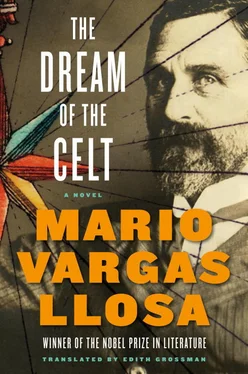For the four years he worked in Liverpool, Roger continued to live with Aunt Grace and Uncle Edward, to whom he gave part of his salary and who treated him like a son. He got on well with his cousins, especially Gertrude, with whom on Sundays and holidays he would go boating and fishing if the weather was good, or stay home reading aloud in front of the fire if it rained. Their relationship was fraternal, without a hint of guile or flirtatiousness. Gertrude was the first person to whom he showed the poems he wrote in secret. Roger came to know the company’s activities thoroughly, and without ever having set foot in African ports spoke about them as if he had spent his whole life among their offices, businesses, procedures, customs, and those who populated them.
He made three trips to West Africa on the S.S. Bounny , and the experience filled him with so much enthusiasm that after the third voyage he gave up his job and announced to his siblings, aunt, uncle, and cousins that he had decided to go to Africa. He did this in an exalted way, and as his uncle Edward said to him, “like those crusaders in the Middle Ages who left for the East to liberate Jerusalem.” The family went to the port to see him off, and Gee and Nina shed some tears. Roger had just turned twenty.
When the sheriff opened the door to the cell Roger was thinking in shame that he had always been in favor of the death penalty. He had made it public a few years earlier, in his “Report on Putumayo” for the Foreign Office, the Blue Book, demanding exemplary punishment for the Peruvian Julio César Arana, the rubber king of Putumayo: “If we could at least achieve his being hanged for those atrocious crimes, it would be the beginning of the end of the interminable martyrdom and infernal persecution of the unfortunate indigenous population.” He would not write those same words now. And he recalled the discomfort he would feel when he entered a house and saw a birdcage. Imprisoned canaries, goldfinches, or parrots had always seemed to him the victims of useless cruelty.
“Visitor,” muttered the sheriff, looking at him with contempt in his eyes and voice. While Roger stood and dusted off his prisoner’s uniform with his hands, he added sarcastically: “You’re in the papers again today, Mr. Casement. Not for being a traitor to your country …”
“My country is Ireland,” Roger interrupted.
“ … but because of your perversions.” The sheriff made a noise with his tongue as if he were going to spit. “A traitor and pervert at the same time. What garbage! It will be a pleasure to see you dancing at the end of a rope, ex–Sir Roger.”
“The cabinet turned down my petition for clemency?”
“Not yet.” The sheriff hesitated before answering. “But it will. And so will His Majesty the king, of course.”
“I won’t petition him for clemency. He’s your king, not mine.”
“Ireland is British,” muttered the sheriff. “Now more than ever after crushing that cowardly Easter Rising in Dublin. A stab in the back of a country at war. I wouldn’t have shot your leaders, I would’ve hanged them.”
He fell silent because they had reached the visitors’ room.
It wasn’t Father Carey, the Catholic chaplain at Pentonville Prison, who had come to see him but Gertrude, Gee, his cousin. She embraced him tightly and Roger felt her trembling in his arms. He thought of a little bird numb with cold. How Gee had aged since his imprisonment and trial. He recalled the mischievous, lively girl in Liverpool, the attractive woman in love with the life of London, whom her friends affectionately called Hoppy because of her damaged leg. Now she was a shrunken, sickly old lady, not the healthy, strong, self-confident woman of a few years earlier. The clear light of her eyes had gone out, and there were wrinkles on her face, neck, and hands. She dressed in dark, worn clothing.
“I must stink like all the rubbish in the world,” Roger joked, pointing at his coarse blue uniform. “They took away my right to bathe. They’ll give it back only once, if I’m to be executed.”
“You won’t be, the Council of Ministers will grant clemency,” Gertrude asserted, nodding to give more force to her words. “President Wilson will intercede with the British government on your behalf, Roger. He’s promised to send a telegram. They’ll grant it, there won’t be an execution, believe me.”
The way she said this was so strained, her voice broke so much, that Roger felt sorry for her, for all his friends who, like Gee, suffered these days from the same anguish and uncertainty. He wanted to ask about the attacks in the papers the jailer had mentioned but controlled himself. The president of the United States would intercede for him? That must be an initiative of John Devoy and other friends from the Clan na Gael. If he did, his action would have an effect. There was still a possibility the cabinet would commute his sentence.
There was no place to sit, and Roger and Gertrude remained standing, very close together, their backs to the sheriff and the guard. The four presences transformed the small visitors’ room into a claustrophobic place.
“Gavan Duffy told me they had dismissed you from Queen Anne’s Academy,” Roger said apologetically. “I know it was on account of me. A thousand pardons, my dear Gee. Causing you harm is the last thing I would have wanted.”
“They didn’t dismiss me, they asked me to accept the cancelation of my contract. And gave me compensation of forty pounds. I don’t care. I’ve had more time to help Alice in the measures she’s taken to save your life. That’s the most important thing now.”
She took her cousin’s hand and squeezed it tenderly. Gee had taught for many years in the school of Queen Anne’s Hospital, in Caversham, where she had become assistant director. She always liked her job and told amusing anecdotes about it in her letters to Roger. And now, because of her kinship to an outcast, she would be unemployed. Did she have enough to live on, or who would help her?
“No one believes the vile things they’re publishing about you,” said Gertrude, lowering her voice a great deal, as if the two men standing there might not hear her. “Every decent person is indignant that the government is using this kind of slander to weaken the manifesto so many important people have signed in your favor, Roger.”
Her voice broke, as if she were going to sob. Roger embraced her again.
“I’ve loved you so much, Gee, dearest Gee,” he whispered in her ear. “And now more than ever. I will always be grateful for how loyal you’ve been in good times and bad. That’s why your opinion is one of the few that matters to me. You know that everything I’ve done has been for Ireland, don’t you? For a noble, generous cause, like the Irish cause. Isn’t that true, Gee?”
She had started to sob, very quietly, her face pressed against his chest.
“You had ten minutes and five have passed,” the sheriff reminded them without turning around to look at them. “You have five left.”
“Now, with so much time to think,” said Roger in his cousin’s ear, “I think a great deal about those years in Liverpool, when we were so young and life smiled on us, Gee.”
“Everybody thought we were in love and would marry one day,” murmured Gee. “I, too, remember that time with nostalgia, Roger.”
“We were more than lovers, Gee. Brother and sister, accomplices. The two sides of a coin. That close. You were many things to me. The mother I lost when I was nine. The friends I never had. I always felt better with you than with my own siblings. You gave me confidence, security in life, joy. Later, during all my years in Africa, your letters were my only bridge to the rest of the world. You don’t know how happy I was to receive your letters and how I read them over and over, dear Gee.”
Читать дальше












